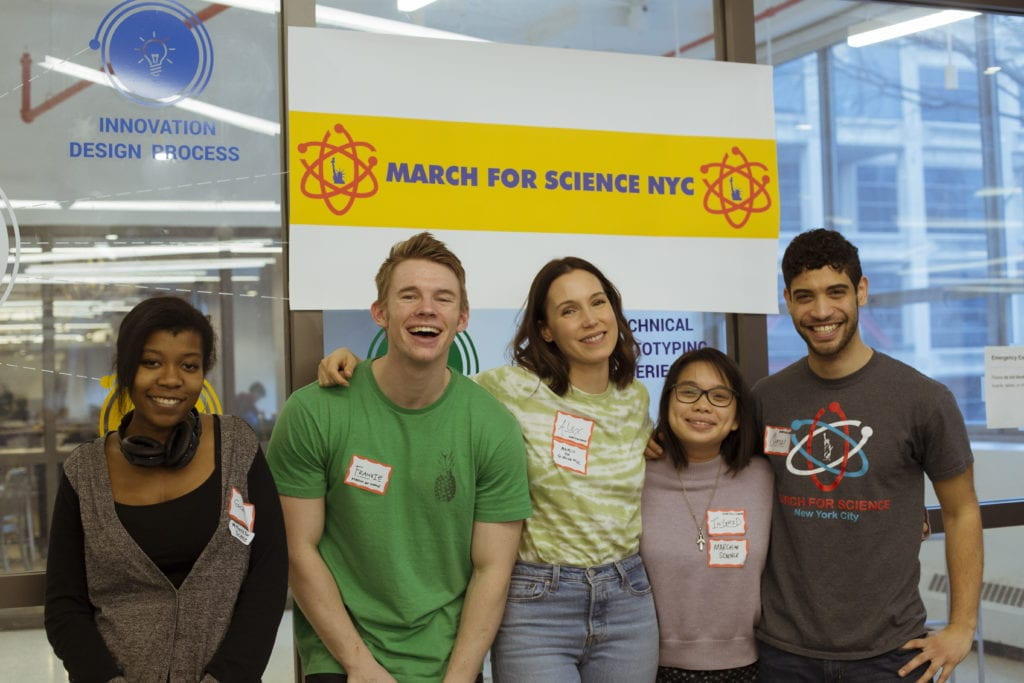
Ingrid J. Paredes is a PhD candidate in chemical engineering at the New York University Tandon School of Engineering. She received her B.S. and M.S. in Chemical and Biochemical Engineering from Rutgers, the State University of New Jersey in 2015 and 2016. Here’s an update from Ingrid about March for Science!
Early into spring semester of 2017, I received a Facebook invite to the inaugural March for Science. At the time, the event had little description, but the description it had was enough to garner my interest – on April 22nd, 2017, scientists would rally in DC as women rallied that January. We would demand funding for research. We would demand robust science. We would demand science for the common good. While the march was formed from the momentum built in reaction to the 2016 election, these demands weren’t new to academic scientists – and so while I’d never been to a march, these statements were easily ones I could publicly stand behind.
The next day at school, I asked Omar, a colleague and friend, if he wanted to come with me to DC. It didn’t require any discussion – he’d seen the Facebook event, too, and had planned to go on his own. Enthusiastic, we asked our other department friends if they wanted to come, and soon our two-person trip turned into a department-wide trip, which then turned into a school-wide trip, which then evolved into our involvement with NYU’s large effort to attend and partner with the march.
Since then, the single-day event has evolved into a global movement calling for robustly funded and publicly communicated science as a pillar of human freedom and prosperity. Thanks largely to NYU’s partnership and the Green Grants Program, Omar and I have become organizers for NYC’s local efforts to support March for Science’s mission. Going in to 2019, we’ve recruited volunteer staff from the NYC area committed to:
- The open access of scientific information to the general public
- The use of science for the common good and in the preservation of an informed democracy
- The protection of human and environmental rights
Our goal is to establish a network of active scientists in New York City. Science is for everyone, and while it isn’t partisan, it is political. We are here to stand up for science and scientists. We’ve fought the graduate student tax. We’ve registered voters. We’ve talked to the public about the intersection of science and policy. We’ve elected scientists into congress. Our work has only just begun, and the march is only one element of what we do.
In 2019 and going forward, we’re focusing our efforts on the the most important issue our generation will face: climate change.
The consequences of our inaction on climate change are here, and if we don’t act now, they are only going to worsen. Some of these consequences will have a permanent effect on our planet and livelihood. Young people all over the globe have recognized the urgency of this situation, and since last year, many of them have gone on strike from school to demand policymakers address climate change. On Friday, March 15, the largest youth climate strike to date took place; over one million people across 123 countries rallied and marched, calling for, “system change, not climate change.”
Strikes happened all over NYC, converging that afternoon into a march from Columbus Circle to the steps of the American Museum of Natural History. March for Science NYC organizers, as official partners of the Youth Climate Strike and Sunrise Movement, attended in support of their efforts. As scientists, we must support the youth in their call for a Green New Deal. An op-ed by 500 Women Scientists sums it up best: science supports the Green New Deal. It’s centered around people and justice. Climate change affects us all, and it will take effort from all fronts to fight it. We will keep striking, rallying, marching until that happens. We have to step up to the challenge.
The March for Science this year is on May 4, 2019, the day after the next Youth Climate Strike. We hope you’ll join us. The youth have spoken, and it’s time for us listen.
NYU Green Grants are awarded to improve the university’s operational environmental performance, foster environmental literacy and community engagement, advance applied research and design, and demonstrate the viability of best practices and technologies for sustainability. The Green Grants Selection Committee awards up to $20,000 for the most feasible, impactful, and innovative projects that have potential for institutionalization on campus or are self-sustaining.

It’s great reading about young people that are trying to make a difference. It is hard to popularize the green idea. As a member of a professional cleaning company in Oxford, I’m aware of the impact we made with the excessive use of chemicals and pollutants. I sincerely hope that we will find a way to slow down global warming as much as possible.